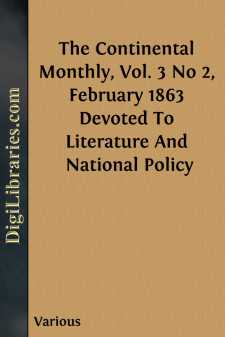Categories
- Antiques & Collectibles 13
- Architecture 36
- Art 48
- Bibles 22
- Biography & Autobiography 813
- Body, Mind & Spirit 142
- Business & Economics 28
- Children's Books 17
- Children's Fiction 14
- Computers 4
- Cooking 94
- Crafts & Hobbies 4
- Drama 346
- Education 46
- Family & Relationships 57
- Fiction 11829
- Games 19
- Gardening 17
- Health & Fitness 34
- History 1377
- House & Home 1
- Humor 147
- Juvenile Fiction 1873
- Juvenile Nonfiction 202
- Language Arts & Disciplines 88
- Law 16
- Literary Collections 686
- Literary Criticism 179
- Mathematics 13
- Medical 41
- Music 40
- Nature 179
- Non-Classifiable 1768
- Performing Arts 7
- Periodicals 1453
- Philosophy 64
- Photography 2
- Poetry 896
- Political Science 203
- Psychology 42
- Reference 154
- Religion 513
- Science 126
- Self-Help 84
- Social Science 81
- Sports & Recreation 34
- Study Aids 3
- Technology & Engineering 59
- Transportation 23
- Travel 463
- True Crime 29
The Continental Monthly, Vol. 3 No 2, February 1863 Devoted To Literature And National Policy
by: Various
Categories:
Description:
Excerpt
OUR NATIONAL FINANCES.
Our national finances are involved in extreme peril. Our public debt exceeds $720,000,000, and is estimated by the Secretary of the Treasury, on the 1st of July next, at $1,122,297,403, and on the 1st of July, 1864, at $1,744,685,586. When we reflect that this is nearly one half the debt of England, and bearing almost double the rate of interest, it is clear that we are approaching a fatal catastrophe. Nor is this the most alarming symptom. Gold now commands a premium of thirty-two per cent., as compared with legal tender treasury notes, and, with largely augmented issues, must rise much higher, with a correspondent increase of our debt and expenditures. Indeed, should the war continue, and there be no other alternative than additional treasury notes, they will, before the close of the next fiscal year, fail to command forty cents on the dollar in gold, and our debt exceed several billions of dollars. This would result from an immense redundancy and depreciation of currency, and from the alarm created here and in Europe, as to the maintenance of the Union, and the ultimate solvency of the Government. Indeed, our enemies, at home and abroad, the rebels, and their allies in the North and in Europe, already announce impending national bankruptcy and repudiation, and there are many devoted patriots who fear such a catastrophe.
That the danger is imminent, is a truth which must not be disguised. Here lies the great peril of the Government. It is not the rebel armies that can ever overthrow the Union. It is the alarming increase of the public debt and expenditures, and the still more appalling depreciation of the national currency, that most imperil the great Republic.
And is the Union indeed to fall? Are we to be divided into separate States or many confederacies, each warring against the other, the sport of foreign oligarchs, the scorn of humanity, the betrayers of the liberty of our country and of mankind? Can we yet save the Republic? This is a fearful and momentous question, but it must be answered, and answered NOW. Inaction is syncope. Delay is death. The life of the Republic is ebbing fast, and the approaching Ides of March may toll the funeral words, It is too late!
What then must be done to avert the dread catastrophe? Action, immediate and energetic action, in the field and in Congress. Winter is the best season for a campaign in the South. On—on—on with the banner of the Republic, by land and sea, and with all the reinforcements, from the Ohio and Potomac to the Gulf. On, also, with the necessary measures in Congress to save our finances from ruin, arrest the depreciation of our national currency, and restore the public credit. We are upon the verge of ruin. We are hanging over the gulf of an irredeemable paper system, and its spectral shade, repudiation, is seen dimly in the dark abyss. The present Congress may save us; but what of the next? Would they, if they could? Who can answer? Can they, if they would? No! no! It will then be too late. Never did any representative assembly encounter so fearful a responsibility as the present Congress. Each member must vote as if the fate of the Union and of humanity depended upon his action. He must rise above the passing clouds of passion and prejudice, of State, local, or selfish interests, into the serene and holy atmosphere, illumined by the light of truth, and warmed by the love of his country and of mankind. His only inquiry must be, What will save the nation? The allegiance to the Union is paramount, its maintenance 'the supreme law,' the lex legum, of highest obligation, and he who, abandoning this principle, follows in preference any real or supposed State policy, is a secessionist in action, and a traitor to his country and mankind. Should the catastrophe happen, no such paltry motives will save him from disgrace and infamy; and, if he be snatched from oblivion, his only epitaph will be: Here lies a destroyer of the American Union. He did not destroy it by bullets, but by votes. He did not march against it with armed battalions; but, a sentinel, he slept on the post of duty, and—his country fell.
What, then, can Congress do? They can consider at once this great financial question, uninterrupted by any other measure, until there shall have been action complete and decisive. But two months more remain of the session. Not another day nor hour must be lost. All admit that something must be done, and done quickly.
What then is the remedy for our depreciated and depreciating national currency? The Secretary of the Treasury anticipated the disaster, and proposed a remedy in 1861. I gave his bank plan then my earnest and immediate support. Well would it have been for our country if it had then been adopted, and gold would not now command a premium of thirty-two per cent. After a year's experience and deliberation, the Secretary reiterates his former recommendation, with words of solemn import, and arguments of great force. His is the chief responsibility. To him is mainly intrusted the custody of the public credit. His is now the duty of saving us from national bankruptcy. At such a time, I would differ from him on such a question, only on the clearest convictions, and then only upon the condition that I had a better plan as a substitute, and that mine could become a law now, and be carried now into practical execution....












